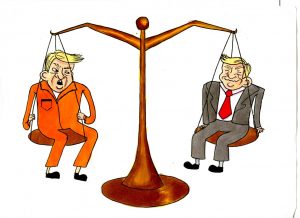History teachers’ perspective on historic impeachment
January 14, 2020
A major part of high school history classes is incorporating current events into class discussion. As politics continue to divide the country more and more, teachers’ political opinions become more and more taboo, and especially for history teachers, finding the balance between different political philosophies and parties while not offending students can be very difficult. But with the historic impeachment and investigation into President Donald Trump, teachers have had a particularly challenging time managing students’ interest and struggling to find the balance between reporting facts and sharing their opinions.
West Essex history teachers Louis Ferarra and Beth Vaknin both described their attempts to work the topic of impeachment into their classes to get students interested in politics and manage students’ biases, interests and more at a time when the whole country is faced with how to understand a landmark moment in American history.
Vaknin starts her AP Government classes talking about impeachment updates daily, and once a week in her U.S. History class. She said that talking about impeachment has also allowed her to teach her students the importance of primary sources and sifting through biased information.
“When sharing your opinion, you have to realize there’s another side,” Vaknin said. “Bring in both perspectives, all perspectives, as many as you can.”
In AP Government, Vaknin said, the students in her classes tend to be a bit older, especially since some are beginning to vote, Vaknin talks about her opinions more often.
“I feel more free to express my opinions,” Vaknin said.
She is a bit more open with her opinions in order for kids to understand more sides of every argument. West Essex has historically leaned conservative as a district, so some students do not get to learn about all other sides.
Ferrara, who teaches AP Human Geography and US History I, said he usually plays devil’s advocate when discussing politics. His intention when discussing politics is to open students up to new viewpoints that they may not be getting from the news or their parents.
“There can be a lot of misunderstandings depending a lot on which news source you look at and which way their views sway” Ferrara said.
Ferrara wants students to understand that they can form their own opinions not based on what their parents think.
This approach is very smart in the sense that teachers are not trying to influence students’ views but just give them all of the facts.
In general, students have mixed opinions on teachers sharing their political opinions in class and how it affects their learning, but most say it’s not a problem so long as it has no impact on what students are actually getting information about.
“I don’t need to talk about impeachment in my math class,” senior Caitlin Katz said. “But it is definitely important to discuss it in a government class since it is happening now and not just in the textbook. Teachers are the best people to explain it in an unbiased manner.”



